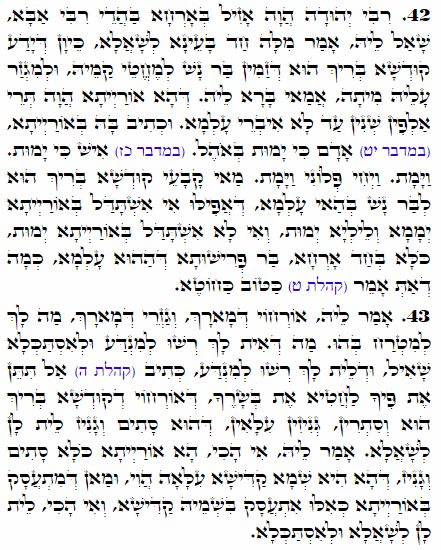Daily Zohar # 2455 – Shelach Lecha – What's before 'one'
Daily Zohar 2455
Daily Zohar 2455

.
Hebrew translation:
43. אָמַר לוֹ, דַּרְכֵי רִבּוֹנְךָ וּגְזֵרוֹת רִבּוֹנְךָ מַה לְּךָ לִטְרֹחַ בָּהֶם? מַה שֶּׁיֵּשׁ לְךָ רְשׁוּת לָדַעַת וּלְהִסְתַּכֵּל – שְׁאַל, וּמַה שֶּׁאֵין לְךָ רְשׁוּת לָדַעַת – כָּתוּב (שם ה) אַל תִּתֵּן אֶת פִּיךָ לַחֲטִיא אֶת בְּשָׂרֶךָ, שֶׁדַּרְכֵי הַקָּדוֹשׁ בָּרוּךְ הוּא וּסְתָרָיו גְּנוּזִים עֶלְיוֹנִים, שֶׁהוּא נִסְתָּר וְגָנוּז אֵין לָנוּ לִשְׁאֹל. אָמַר לוֹ, אִם כָּךְ, הֲרֵי הַתּוֹרָה כֻּלָּהּ נִסְתֶּרֶת וּגְנוּזָה, שֶׁהֲרֵי הִיא שֵׁם קָדוֹשׁ עֶלְיוֹן, וּמִי שֶׁמִּתְעַסֵּק בַּתּוֹרָה כְּאִלּוּ הִתְעַסֵּק בִּשְׁמוֹ הַקָּדוֹשׁ, וְאִם כָּךְ אֵין לָנוּ לִשְׁאֹל וּלְהִסְתַּכֵּל.
.
Zohar Shelach Lecha
Ecclesiastes 9:2
“הַכֹּל כַּאֲשֶׁר לַכֹּל, מִקְרֶה אֶחָד לַצַּדִּיק וְלָרָשָׁע לַטּוֹב וְלַטָּהוֹר וְלַטָּמֵא, וְלַזֹּבֵחַ, וְלַאֲשֶׁר אֵינֶנּוּ זֹבֵחַ: כַּטּוֹב, כַּחֹטֶא–הַנִּשְׁבָּע, כַּאֲשֶׁר שְׁבוּעָה יָרֵא”
“The same destiny ultimately awaits everyone, whether righteous or wicked, good or bad, ceremonially clean or unclean, religious or irreligious. Good people receive the same treatment as sinners, and people who make promises to God are treated like people who don’t.”
This verse simply states the obvious that everyone’s destiny is to die. Righteous or wicked, pure or impure, pious or not.
Rabbi Yehuda in the Zohar asks the important question about why the Torah that existed 2000 years before the creation of the world mentions death and how did God know that man would sin and bring mortality onto himself. And what God wants from a person that even if he is dedicated to the study of Torah days and nights, he dies, and if he does not study Torah, he also dies. Why in this aspect the same for everyone?
Rabbi Aba answered him saying that the ways of our Creator are beyond our understanding. We may ask the questions but we may not get to a point of losing the faith because it will be accounted for us as a sin.
Ecclesiastes 5:5
“אַל-תִּתֵּן אֶת-פִּיךָ, לַחֲטִיא אֶת-בְּשָׂרֶךָ, וְאַל-תֹּאמַר לִפְנֵי הַמַּלְאָךְ, כִּי שְׁגָגָה הִיא: לָמָּה יִקְצֹף הָאֱלֹהִים עַל-קוֹלֶךָ, וְחִבֵּל אֶת-מַעֲשֵׂה יָדֶיךָ”
“Do not let your speech cause you to sin and do not say in the presence of the angel of God that it was a mistake. Why should God be angry on account of your voice and destroy the work of your hands?”
The entire Torah is the holy name and our study is dealing with that name. We can not grasp what’s before God because we are in the world of ‘measure’. Time, distances, units etc. we count from 1 and can continue to infinite. Before 1* there’s nothing to count and that is where the beginning and YHVH is. As a unit in this world we can not go beyond the one and understand the force of before that beginning but we can definitely understand from the point of ‘one’. In the important prayer of Shema Yisrael we say “Hear O Israel, YHVH our God, YHVH is one”
* The idea of ‘one’ came from a lecture I heard from Rabbi Ben Zion Mutzafi, Shlita (Jerusalem, Israel)
{||}

